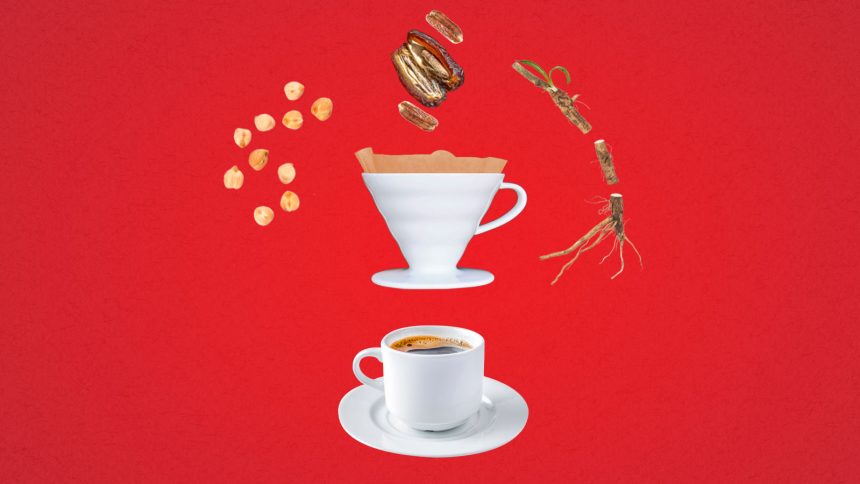This story was produced by Grist and co-published with Slate. When Henri Kunz was growing up in West Germany in the 1980s, he used to drink an instant coffee substitute called Caro, a blend of barley, chicory root, and rye roasted to approximate the deep color and invigorating flavor of real coffee. “We kids drank it,” Kunz remembered recently. “It had no caffeine, but it tasted like coffee.” As an adult, Kunz loves real coffee. But he also believes its days are numbered. Climate change is expected to shift the areas where coffee can grow, with some researchers estimating that the most suitable land for coffee will shrink by more than half by 2050, and hotter temperatures will make the plants more vulnerable to pests, blight, and other threats. At the same time, demand for coffee is growing, as upwardly mobile people in traditionally tea-drinking countries in Asia develop a taste for java.
“The difference between demand and supply will go like that,” Kunz put it during a Zoom interview, crossing his arms in front of his chest to form an X, like the “no good” emoji. Small farmers could face crop failures just as millions of new people develop a daily habit, potentially sending coffee prices soaring to levels that only the wealthy will be able to afford. To stave off the looming threats, some agricultural scientists are hard at work breeding climate-resilient, high-yield varieties of coffee. Kunz, the founder and chair of a “flavor engineering” company called Stem, thinks he can solve many of these problems by growing coffee cells in a laboratory instead of on a tree. A number of other entrepreneurs are taking a look at coffee substitutes of yore, like the barley beverage Kunz grew up drinking, with the aim of using sustainable ingredients to solve coffee’s environmental problems — and adding caffeine to reproduce its signature jolt.
A crop of startups, with names like Atomo, Northern Wonder, and Prefer, is calling this category of throwbacks “beanless coffee,” even though in some cases their products contain legumes. Beanless coffee “gives you that legendary coffee taste and all the morning pick-me-up you crave, while also leaving you proud that you’re doing your part to help unf–k the planet,” as the San-Francisco based beanless coffee company Minus puts it.
But it’s unclear whether coffee drinkers — deeply attached to the drink’s particular, ineffable taste and aroma — will embrace beanless varieties voluntarily, or only after the coming climate-induced coffee apocalypse forces their hand. Coffea arabica — the plant species most commonly cultivated for drinking — has been likened to Goldilocks. It thrives in shady environments with consistent, moderate rainfall and in temperatures between 64 and 70 degrees Fahrenheit, conditions often found in the highlands of tropical countries like Guatemala, Ethiopia, and Indonesia.
Although coffee plantations can be sustainably integrated into tropical forests, growing coffee leads to environmental destruction more often than not. Farmers cut down trees both to make room for coffee plants and to fuel wood-burning dryers used to process the beans, making coffee one of the top six agricultural drivers of deforestation.
Today’s beanless-coffee startups are attempting to put a modern spin on these time-honored, low-tech coffee substitutes. Northern Wonder, based in the Netherlands, makes its product primarily out of lupin beans — also known as lupini — along with chickpeas and chicory. Atomo, headquartered in Seattle, infuses date seeds with a proprietary marinade that produces “the same 28 compounds” as coffee, Atomo boasts.
Singapore-based Prefer makes its brew out of a byproduct of soymilk, surplus bread, and spent barley from beer breweries, which are then fermented with microbes. Minus also uses fermentation to bring coffee-like flavors out of “upcycled pits, roots, and seeds.” All these brands add caffeine to at least some of their blends, aiming to offer consumers the same energizing effects they get from the real deal.
In trying to explain what makes today’s beanless coffees different from the oldfangled kind, David Klingen, Northern Wonder’s CEO, compared the relationship to the one between modern meat substitutes and more traditional soybean products like tofu and tempeh. Many plant-based meats contain soybeans, but they’re highly processed and combined with other ingredients to create a convincing meat-like texture and flavor. So it is with beanless coffee, relative to Caro-style grain beverages.
Each of these new beanless coffee companies has a slightly different definition of sustainability. Northern Wonder’s guiding light is non-tropical ingredients, “because we want to make a claim that our product is 100 percent deforestation free,” Klingen said. Almost all its ingredients are annual crops from Belgium, France, Germany, Switzerland, and Turkey, countries whose forests are not at substantial risk of destruction from agriculture. Annual crops grow more efficiently than coffee trees, which require years of growth before they begin producing beans.






